The kingdom and I: How Miami’s mayor helped Saudi Arabia rehab its bloody reputation
- Oops!Something went wrong.Please try again later.
Editor's note: Viewing this story in our app? Click here for a better experience on our website.
As Saudi Arabia sought to rehabilitate its image after decades of bad-for-business headlines about 9/11 hijackers, alleged police torture, public beheadings and the gruesome murder of a Washington Post journalist, the regime turned to an unlikely ally for PR and networking assistance: Miami Mayor Francis Suarez.
Suarez was in Saudi Arabia last October rubbing shoulders with Saudi royalty at their global trade summit, dubbed “Davos in the Desert,” when he learned that Yasir Al-Rumayyan, right hand to the crown prince, wanted to co-host a similar event with him in Miami. Suarez later recalled his response: “I’m all in.”
Using his public office, including the city seal, Suarez gave the Saudi regime what it wanted: a public relations boost at a time when it was seeking to spread its influence around the globe and brand itself “a force for good.” As a bonus, he was also able to significantly benefit a major client of the international law firm that pays him more than $1 million a year.
Suarez talked about how he got involved with the effort as he sat next to Al-Rumayyan on stage at the March 30-31 summit — which, despite its Miami branding, was actually held at an exhibition hall in Miami Beach.
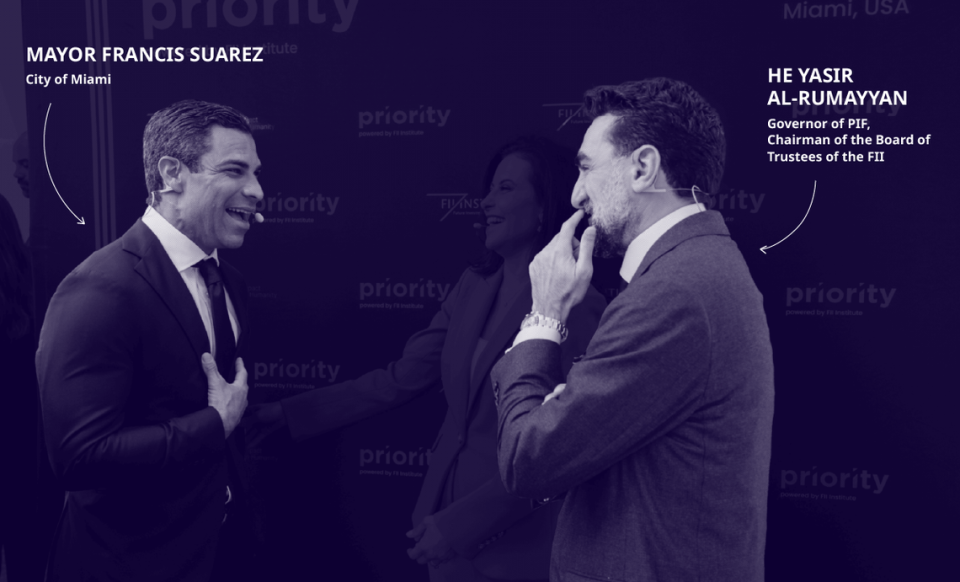
Internal communications and planning documents obtained as part of the Miami Herald’s investigation into Miami City Hall show the extent to which Suarez put himself and his public office at the service of the Saudis. He was provided a lengthy roster of tycoons and celebrities that the Saudis wanted invited — ranging from Marc Anthony to Shakira — as well as a list of which sessions the mayor needed to attend, when he should show up and what talking points he should follow.
Although it wasn’t obvious from glossy advertisements, featuring a mayoral endorsement and the slogan “Humanity is the Priority,” the Florida summit was part of Saudi Arabia’s subtle, multifaceted campaign, to use the investment power of its oil-soaked sovereign wealth fund to diversify and grow its economy, buff over the regime’s bloody reputation and recast the nation as a leader in sustainability, innovation and progress.
Now, the Miami summit is caught up in an ongoing congressional investigation into how Saudi Arabia has bought its way into popular U.S. institutions and used them to reshape the public narrative in the United States. According to expert witnesses interviewed during a September hearing, Saudi Arabia has invested billions in global initiatives aimed at winning over influencers and celebrities, who — wittingly or not — then become part of the regime’s campaign to “convince international investors to invest in the country despite pervasive human rights violations,” as one witness put it.
The testimony did not mention Suarez by name. In a letter, congressional investigators flagged the Florida summit as an indication that Saudi Arabia’s Public Investment Fund — the sovereign wealth fund that puts on the conference series — planned to take an “active role” in an ever-wider range of American institutions.
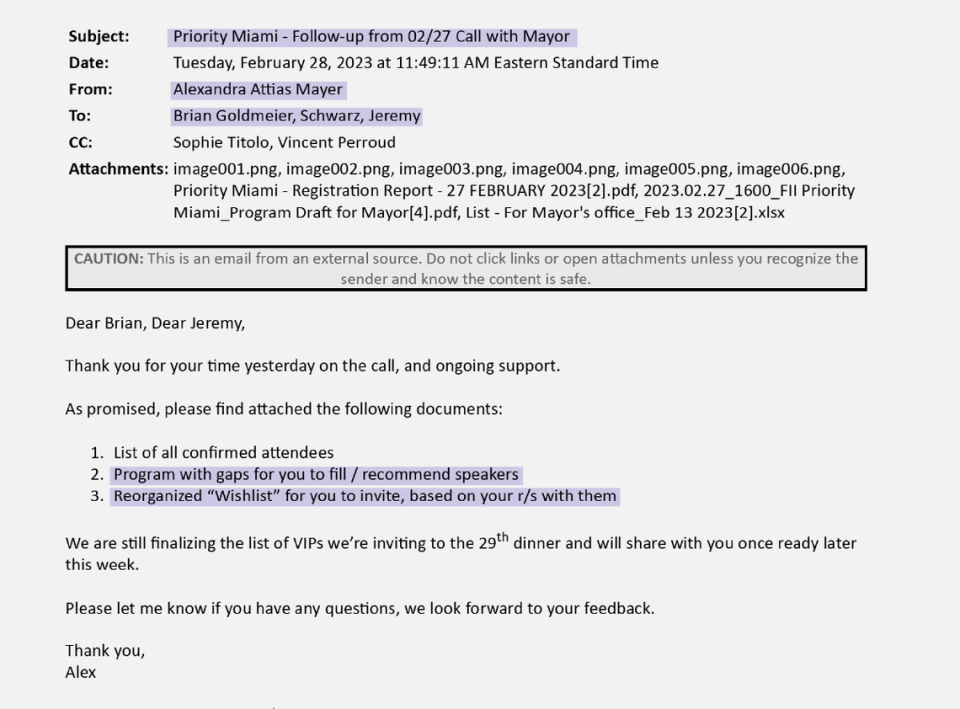
A Cuban American who condemns repressive regimes in Latin America, Suarez has developed an increasingly cozy relationship with the Saudi regime, known for executing internal dissenters. He has quietly spent weeks in Saudi Arabia over several recent trips, records show, as he travels to the region as a private attorney for Quinn Emanuel Urquhart & Sullivan, an international litigation firm that counts the Public Investment Fund among its clients.
Suarez, who travels to help the firm grow its business, has accepted speaking invitations to at least three state-run conferences promoting the firm’s client, the Saudi wealth fund — including the South Florida conference the mayor’s office co-sponsored.
Both Suarez and Quinn Emanuel maintain that there is a firewall separating his work for the firm from his mayoral duties and that Suarez is not an attorney for the fund, and was not representing the firm at any of the fund’s events. But that distinction is not always clear in practice. At Catalyze Saudi, a 2022 event sponsored by a fund subsidiary, Suarez addressed the crowd in front of a large screen that introduced him as both the Miami mayor and an attorney for the firm.
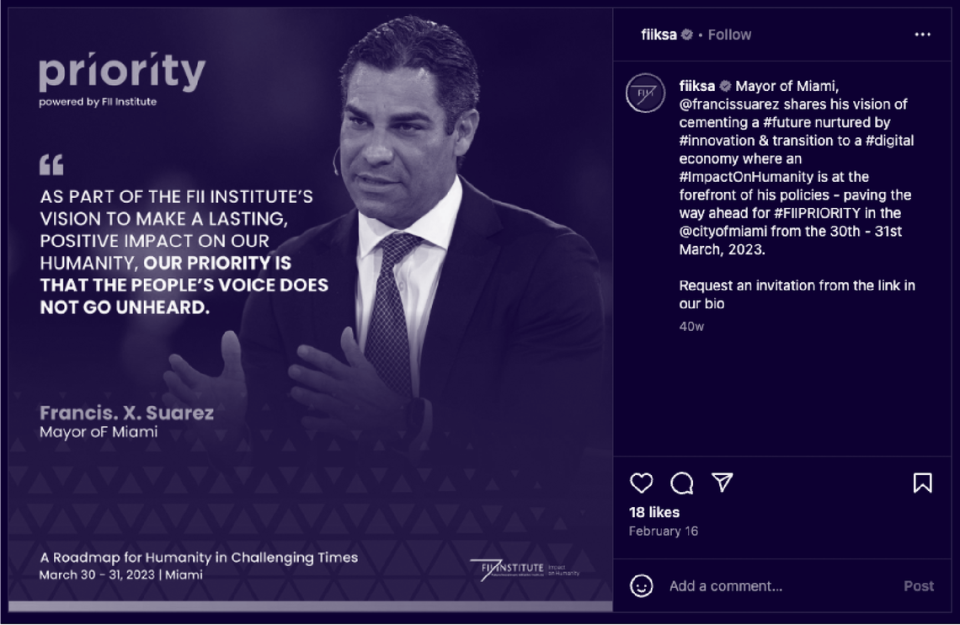
“The mayor can’t have it both ways,” said Frank Figliuzzi, former assistant director of counterintelligence for the FBI. The mayor can’t travel and work for the Saudis on behalf of the firm, and then turn around and slap the city name on a conference series, he said.
Ultimately, Figliuzzi said, “this is about national security.”
Once an agent assigned to Miami, Figliuzzi said the conference appears to have been part of the Saudis’ “grand influence scheme to shape American perceptions by appealing to Americans’ pocketbooks,” also raising “legitimate questions” about whether Miami’s mayor had been working as an unregistered agent for the regime, a potentially criminal offense.
Stephanie Severino, the mayor’s communications director, said Suarez and his staff did not engage in any activities that would require registration as foreign agents. Severino said Suarez’s involvement with the Saudi conferences — both in Florida and abroad — has been limited to speaking engagements, and his participation is uncompensated, solely in his role as mayor, and unrelated to his work for Quinn Emanuel.
“His law firm is not involved in his public work, and his public work as mayor does not influence his private responsibilities,” Severino said.
She added that the mayor was not involved in planning the event in Miami. And she said the summit, though it took place in Miami Beach, benefited Miami because it promoted the city’s brand.
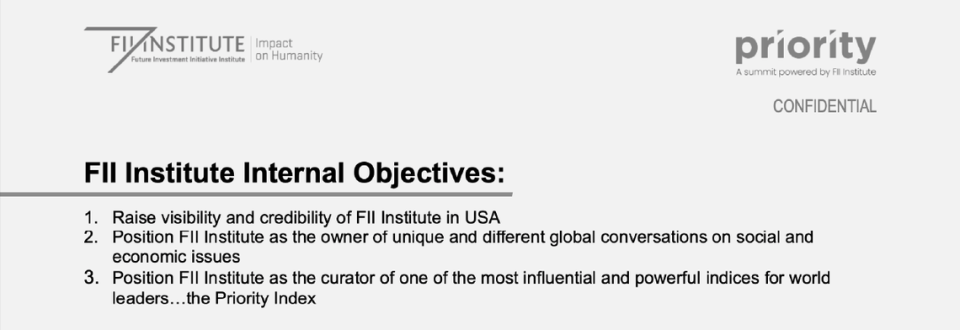
There was no mention of a benefit for Miami in the list of the summit’s internal objectives provided to the mayor’s office, which focused only on using the event to “raise the visibility and credibility” of the Saudi wealth fund’s conference series and associated think tank in the United States. The “confidential” document called Miami “the perfect partner” for the Saudi initiative.
In September, the Permanent Subcommittee on Investigations housed within the U.S. Senate Committee on Homeland Security and Governmental Affairs issued a sweeping subpoena for information about Public Investment Fund activities in the United States. That would include records related to the Future Investment Initiative Institute, the fund’s nonprofit subsidiary behind the Miami summit and other conferences.
The congressional probe was spawned by the success of the upstart LlV Golf tour, what the committee called a Saudi-funded “takeover” of the PGA Tour. By offering unheard-of amounts of money — “blood money,” critics called it — LIV lured away many of the PGA Tour’s elite players, all but forcing an agreement to merge.
Legendary golfer Greg Norman, CEO of the breakaway tour, became a celebrity participant in the Miami Beach summit, and a featured speaker for a session titled “The Business of Sport — Disrupting Traditional Models.”
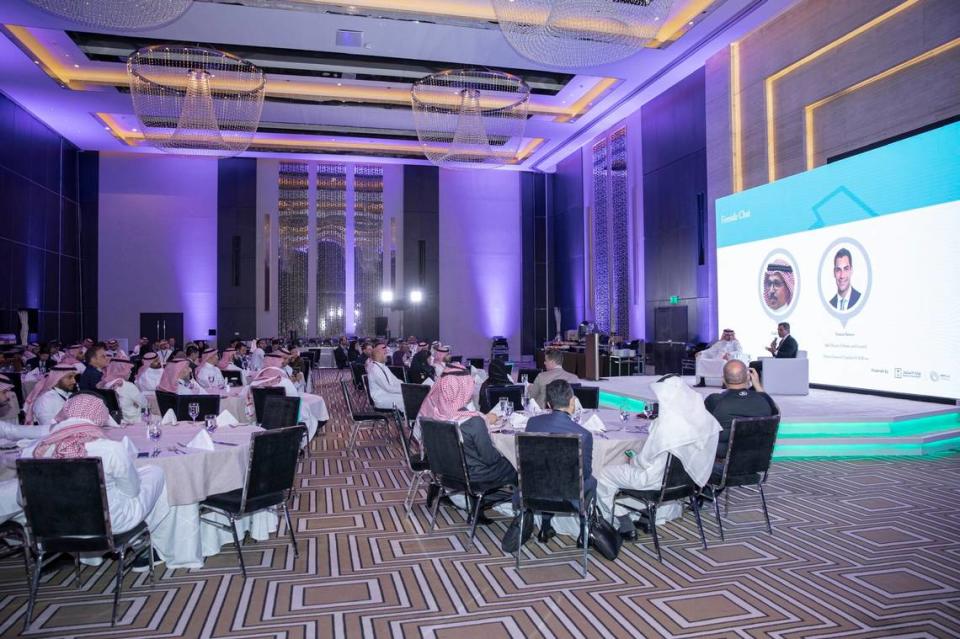
While a trade conference might look benign — and appear to have nothing to do with the battle royale raging over the future of golf — Connecticut’s Richard Blumenthal, the Democratic U.S. senator who chairs the subcommittee, said the Miami conference should be viewed as part of a well-funded effort to steer U.S. public opinion.
“The Saudi regime has not been shy about its aim of normalizing human rights abuses, suppressing criticism and obtaining influence abroad,” Blumenthal told the Herald. “Each investment, ad campaign or seemingly innocuous conference or sports tournament helps Saudi Arabia further these goals.”
Suarez, who said he was unaware of the congressional probe, seemed at least nominally aware of the role the March summit played in Saudi Arabia’s master plan — titled Vision 2030 — which he hailed by name for the event’s success. From the stage, Suarez praised Saudi Arabia for what he described as the fastest “idea-to-execution time frame” of almost any nation in the world.
‘A good friend to the kingdom’
Suarez has credited two people with introducing him to Saudi Arabia.
One is his boss, John Quinn, the founder of Quinn Emanuel, who brought him to the firm’s newly opened Riyadh office. The other is Jared Kushner, the son-in-law and Middle East adviser to then-President Donald Trump. Kushner’s private equity firm recently received a $2 billion investment from Saudi Arabia’s sovereign wealth fund. Kushner, who recently moved to the Miami area, did not respond to a request for comment.
Now, Suarez describes himself as being in a “friendly, loving competition” with Crown Prince Mohammed bin Salman over whether Riyadh or Miami would become the “central aggregator and deployer of capital in the world.”
In reality one is a part-time mayor and the other a Middle-Eastern strongman. But Saudi officials have leaned into Suarez’s narrative, boosting Miami’s image as an emerging hub for technology and venture capital.
“You are not just a good friend to the kingdom, but, honestly, a real symbol of hope, of what transformation can be through an inspirational leader,” said the Saudi ambassador to the United States, Princess Reema bint Bandar Al Saud. She spoke while welcoming Suarez to the stage in October 2022 at Davos in the Desert, the flagship trade conference put on by the wealth fund’s Future Investment Initiative Institute.
The mayor’s office insisted there was nothing unusual about Suarez’s participation in that conference, which is frequented by businesspeople and government officials from around the world. But he was the only sitting U.S. elected official on the event’s list of speakers.
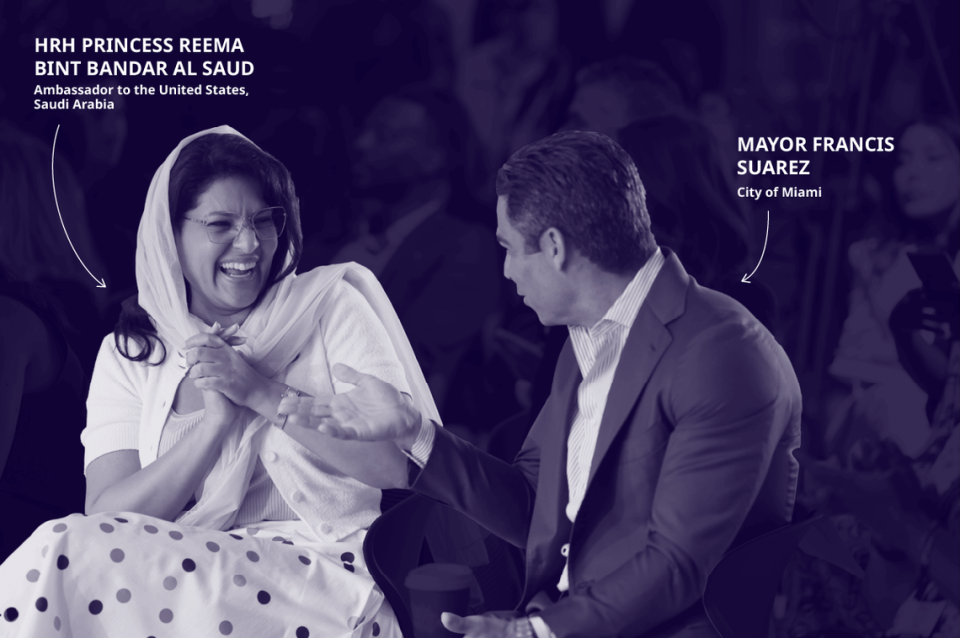
Most U.S. government agencies had shunned the three-day event that year after the Biden administration accused the Saudis of undermining international peace efforts by limiting oil production to boost prices in coordination with Russia — which depends on oil revenue to wage its war of aggression against Ukraine.
Hossein Askari, professor emeritus at George Washington University and former special advisor to the Saudi minister of finance, said the multiple speaking invitations and effusive praise are indicative of Suarez’s strategic importance to Saudi officials, whose plan to diversify their economy requires exposure to vibrant economic markets around the world.
“One of the things that they would like to do is to get important U.S. politicians to be on their side,” Askari said.
Partnering with a mayor to bring the wealth fund’s investment conference to a major U.S. city would have been especially attractive to the crown prince, he said, after a U.S. intelligence report tying the Saudi royal to the murder and dismemberment of journalist Jamal Khashoggi unleashed an international boycott movement.
“When that was done, Saudi Arabia’s name was in the mud,” Askari said. “Nobody wanted to go to Riyadh when [the crown prince] had his first investment meeting. None of the companies wanted to go there.”
To regain footing on the international stage, Saudi officials use connections as currency. And their eagerness to break into the Miami market — where emails show they hoped to open a local office — has created reciprocal benefits for Suarez and his associates. They were seen as a critical nexus between Saudi investors and South Florida’s business community.
Saudi investment in U.S. companies increased from $2.3 billion to $35 billion in the four years between March 2019 and March 2023, according to Senate investigators. While that money is seen as a boon to the economy, the congressional probe is focused on how “investment can also be used as a tool of influence.”
The fund, investigators noted, now has a seat on the board of Uber and is a major financial backer of X, formerly called Twitter. A former employee of the social media company was convicted in 2022 in federal court of stealing user data on behalf of Saudi Arabia, which recently sentenced a dissident with eight followers to death after he used the platform to post critically about the regime.
In an effort to get Suarez to commit to being guest of honor at a VIP dinner with Princess Reema, the Saudi ambassador, during this year’s Miami summit, the organizer dangled a carrot: access to a “curated group of CEOs and other high-level business leaders.”
The mayor’s office responded that Suarez would attend.
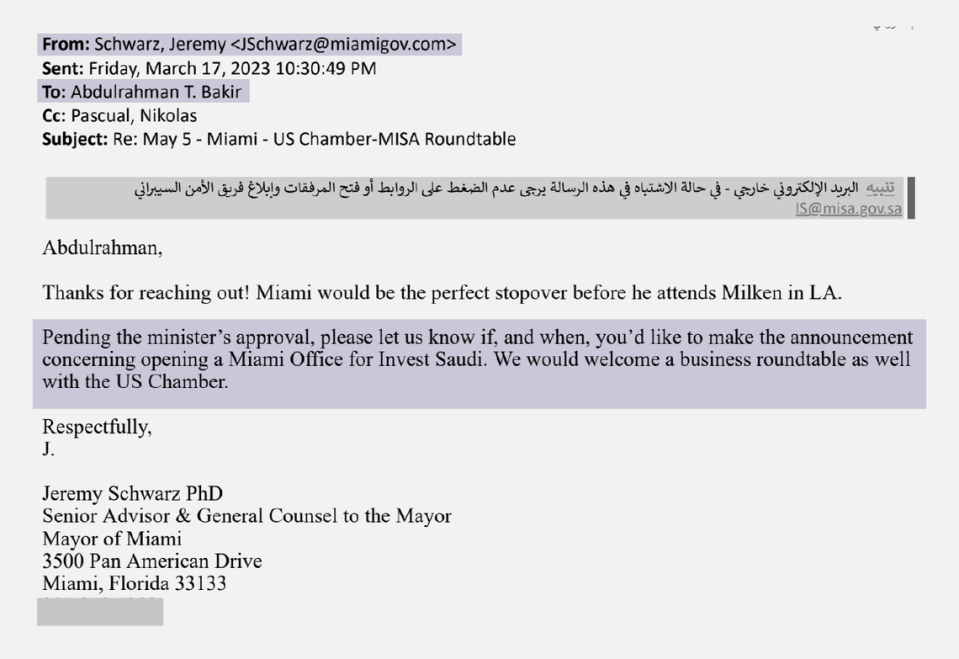
Welcome to Miami (Beach)
The way Suarez told the story during his opening remarks at the Florida summit, the plans for the March event took shape after he received a call from Richard Attias, a public relations consultant who was appointed by royal decree to run Saudi Arabia’s conference series.
“We’re going to do this in March,” Suarez recalled Attias saying when the mayor answered the phone.
It wasn’t a question.
“March 2024?” Suarez asked.
“No, March 2023,” Attias replied.
“Okaaay,” Suarez said he responded, apparently surprised about the tight timeline to turn around an international summit. But he and Attias made it happen with the help of a handful of city staffers and Suarez’s longtime political fundraiser, emails show.
No one outside of the mayor’s office was aware of the plans for the Saudi summit, according to city spokesperson Kenia Fallat.
The fundraiser, Brian Goldmeier, was paid in excess of $90,000 by Suarez’s political committee around the same time. He said the money was not for work on the Miami conference, which he says he did voluntarily, but to help an unnamed American friend “with a few ideas and contacts.”
Emails indicate Goldmeier and the mayor’s top aide, Jeremy Schwarz, were the primary points of contact for Attias’ staff as they passed along information and talking points from Saudi officials.
In one email thanking the duo for “ongoing support” following a late February planning call with the mayor, Attias’ staff provided a “wishlist” of local influencers.
This version of the list, sent to the mayor’s office in February 2023, included celebrities, sports team owners, real estate tycoons and financiers.
Thirteen were on this year’s Forbes 400 list of the wealthiest people in the U.S.
Many run in Suarez’s circles. They’ve attended the same parties or events he frequents.
Six had participated in episodes of Suarez’s YouTube series “Cafecito Talk.”
It’s not clear from the emails who from the list actually attended. But an initial roster of confirmed attendees sent in late February listed a number of people with known connections to the mayor, including about a dozen recent donors to his political campaigns.
Among them were MoonPay founder and CEO Ivan Soto-Wright and Starwood Capital Group Chairman Barry Sternlicht, who respectively donated $500,000 and $100,000 to the political committee backing Suarez’s failed bid for the Republican nomination earlier this year. The other speakers collectively donated over $150,000.
Miami-based developer Craig Robins, a Suarez donor who spoke on a panel titled “Investing in Quality of Life”, said his invitation came directly from conference organizers. He said the conference was a “wonderful” experience.
“I think Saudi Arabia is increasingly important in the worlds of finance and investment,” Robins said in an interview. “The panel I was on was extraordinary.”
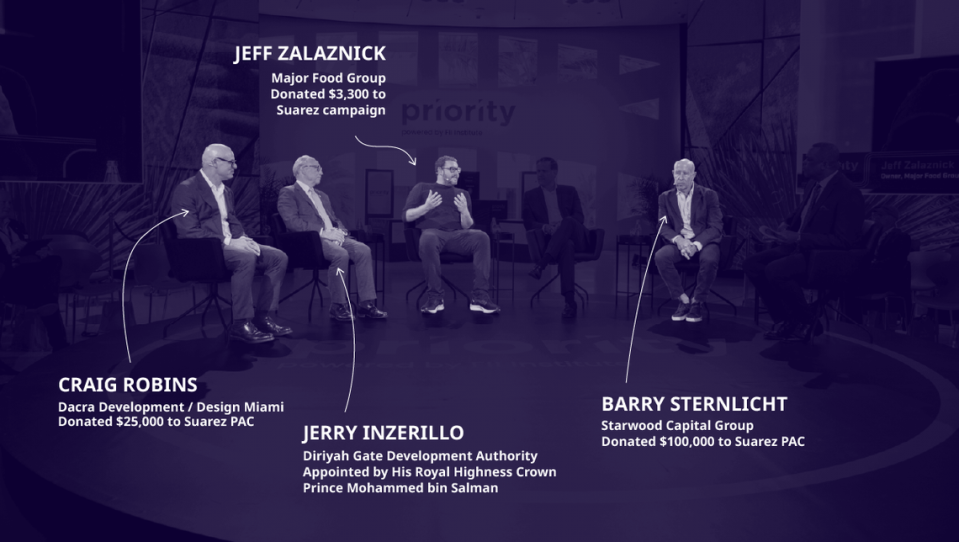
Miami wasn’t the first U.S. city to host Saudi Arabia’s international conference series — titled FII Priority. A small event was held in New York in September 2022, but the program shows a limited speakers list. New York Mayor Eric Adams was not included, nor were any other U.S. officials.
With Suarez’s mayoral endorsement, the summit in Florida attracted nearly 850 guests, according to conference organizers.
No one included on the conference planning emails has registered as foreign agents with the Department of Justice, as is required by federal law for anyone involved in political advocacy or public relations work in the United States on behalf of a foreign government, with a few narrow exceptions. That could be a problem for the mayor and his staff, according to five experts on the Foreign Agents Registration Act, known as FARA, consulted for this article.
Elected officials often organize mutually beneficial partnerships with foreign governments, such as sister-city agreements, those experts pointed out. But, they said, working under the Saudis’ direction to plan and promote a conference primarily benefiting the kingdom’s sovereign wealth fund likely requires registration as a foreign agent. Failing to do so could be a criminal offense.
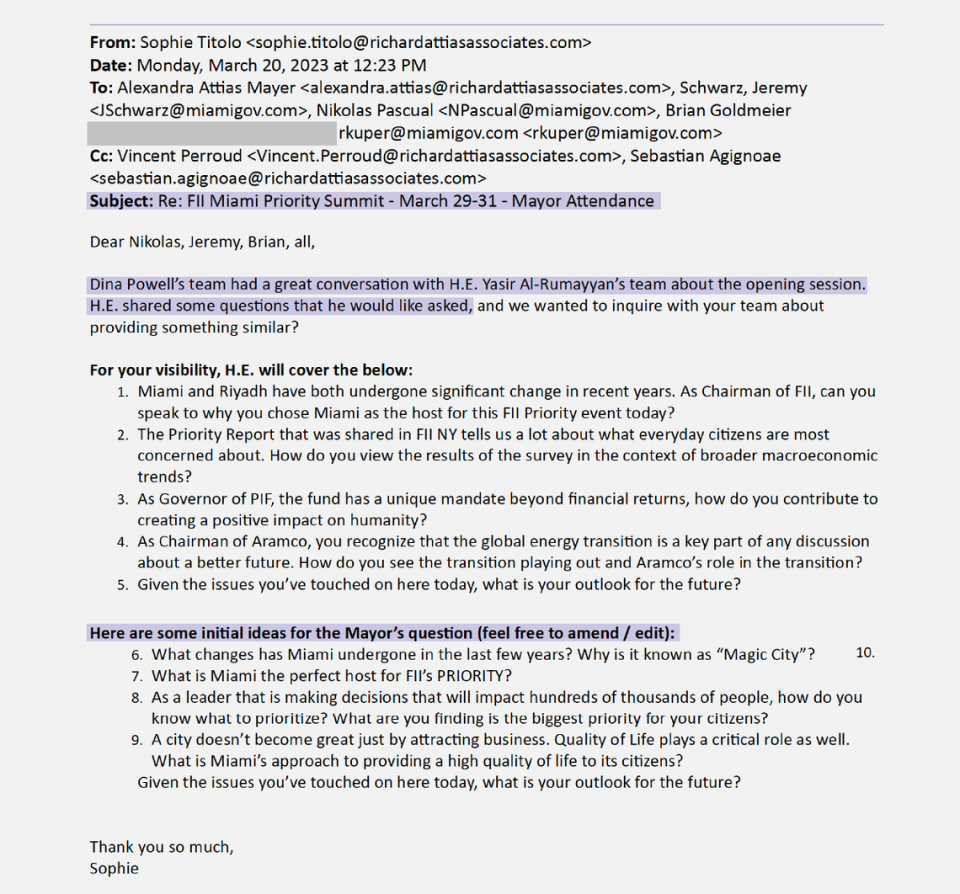
Joshua Ian Rosenstein, political law partner at Sandler Reiff Lamb Rosenstein & Birkenstock, called Suarez’s conference planning efforts “precisely the type of situation that the Justice Department takes significant interest in.” Particularly, he said, because it involves a public official.
Federal prosecutors have been taking an increasingly aggressive approach to enforcing the once obscure FARA statute following widespread concerns that foreign actors had influenced the 2016 presidential elections, according to Michael Sherwin, a former assistant U.S. attorney.
Sherwin pointed to the arrest of New Jersey Sen. Bob Menendez, a Democrat accused of working as an unregistered agent for Egypt, calling the case a “shot across the bow” to elected officials. The warning, he said, is that there is no political exemption for work done predominantly on behalf of a foreign government, regardless of whether a politician acted with the intention of generating goodwill or did a favor that also provided some reciprocal benefit to American citizens.
“If you’re doing this advocacy, you have to register,” Sherwin said, “even if you don’t get five cents.”
Return Trip
Unbeknownst to anyone outside of his tightest circles, Suarez returned to Saudi Arabia in mid-October. Unlike in the past, Suarez did not bring his police security detail, eliminating the paper trail that is created by his city-funded sergeants who have to file requests to accompany him outside of Miami.
Without the records, it’s not clear how long the mayor stayed in Saudi Arabia, or what he did there. For more than a week, his social media accounts featured only pre-packaged material about Miami.
The mayor’s office confirmed the trip occurred only after reporters learned about it from other sources and asked about its purpose. The statement said he had traveled on private business but did not attend this year’s “Davos in the Desert”, the seventh-annual Future Investment Initiative conference, which coincided with his trip.
Despite the mayor’s absence, Miami was still top of mind for conference organizers in Riyadh.
“I cannot wait to be in Miami. I love Miami and Miami is the new America,” Attias, CEO of the wealth fund’s conference series, told reporters at an October press conference. He said invitations would go out soon for a planned February 2024 event in South Florida.
Suarez said he has not been invited.
Credits
Sarah Blaskey | Investigative Reporter
Tess Riski | Municipal Government Reporter
Joey Flechas | City of Miami Reporter
Susan Merriam | Graphics Reporter
Casey Frank | Senior Investigations Editor
Dana Banker | Senior Managing Editor
Rachel Handley | Illustrator

